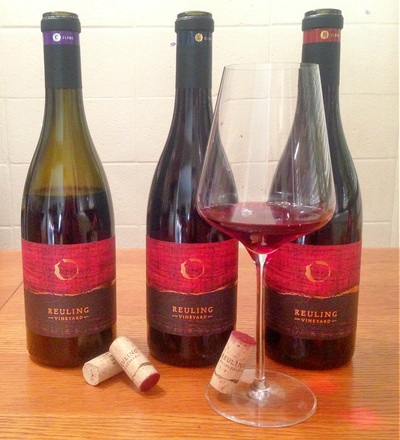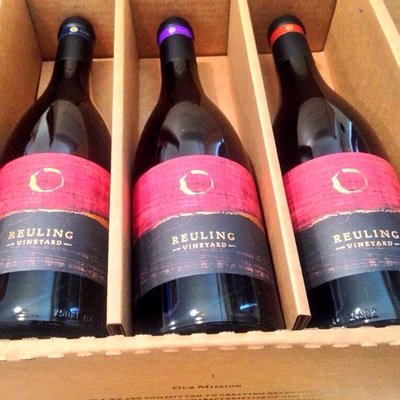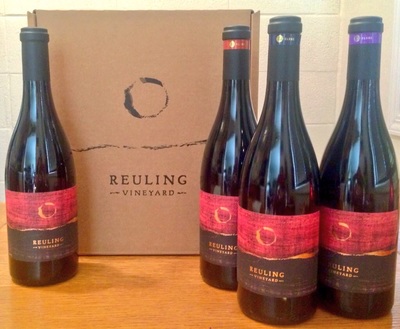|
Burgundian-Style, California Pinot Noir
Pinot Noir is quite literally on the tips of everyone’s tongues these days—both as people enjoy the wine and as people continue to talk about it. It’s an interesting varietal that can be interpreted in many ways—depending on vineyard practices and winemaking techniques—and as wine lovers learn more and challenge themselves to expand their palates, varying styles of Pinot Noir are being sought after by just about everyone. One thing is for certain: the demand for high quality Pinot Noir is on the rise—and winemakers are responding in kind. Case in point--Reuling Vineyard, located on a 16-acre property just outside of Forestville in Sonoma County, has splashed onto the Pinot Noir scene with their Burgundian-style expressions. The boutique-size, family-owned winery focuses production strictly on Pinot Noir and Chardonnay, and many of the clones they work with are Burgundian—making their wines taste delightfully similar to wines from Burgundy. In fact, of much of the Sonoma County Pinot Noir I have tasted, ReulingVineyard’s newly-released 2013 Pinot Noirs tastes more like French Red Burgundy than just about anything else on the local market. The Pinot Noir Clonal Collection Ever since the family purchased their property in 1998, and planted their vines in 2000, they have been caring for the vineyards in a sustainable and biodynamic environment. In 2010 they produced their first vintage, and this year, they just released their third vintage with the new releases. With the immense quality of the 2013 vintage, Winemaker Matt Taylor decided to do something different with the wines. For the first time ever, Reuling Vineyard released their Pinot Noir Clonal Collection—a unique selection of wines that showcase the individual characteristics of three distinct clones, as well as one blend that brings together each of the clones. The family “focused on wanting to make the wine in a Burgundian style with clones that would match that interest,” Marika Reuling states. Hence why two illustrious “suitcase” Vosne-Romanée clones were chosen, as well as the renowned Calera clone. (It’s worth noting that they also work with an exquisite Montrachet Chardonnay clone.) To say that the family has chosen their clones wisely is an understatement; they have clearly honored their Burgundian-style winemaking passion by choosing to work with these particular clones. The 2013 Vintage 2013 birthed incredible fruit and in Taylor’s eyes, possessed the perfect quality to showcase and introduce their Pinot Noir Clonal Collection. Taylor truly “felt that each individual clone was really singing, and doing something special during that harvest,” Reuling says. “It’s been fascinating to see watch Taylor do something different with these grapes.” Something different, indeed. Taylor has produced California Pinot Noir from the Sonoma Coast appellation that really does taste like Burgundy, and in that regard, he has also carved out a unique space where locals can experience a different style of Sonoma Cost Pinot Noir. In these wines, their uniqueness shines brightly and Taylor transcends the bounds of expectations. Clearly drawing on a Burgundian style of winemaking, the wines showcase their terroir and natural characteristics; the inclusion of whole cluster fermentation with native yeast, as well as a small percentage of new oak used for aging, contributes to their Burgundian style and distinct qualities. Simply put, Reuling Vineyard’s 2013 Pinot Noir Clonal Collection is a taste of French red Burgundy from California’s Sonoma Coast. I have no doubt that Pinot Noir lovers will be jumping on the Clonal Collection in no time to store bottles away in their cellars. Reuling Vineyard Terroir Let’s talk terroir. Like all California Pinot Noir, Reuling Vineyard’s vines are endowed with a significant maritime influence; perched atop a knoll of sandy Goldridge soils at a western-facing exposure, the microclimate is ideal for Pinot Noir and Chardonnay. Due to its proximity to the coast, as well as its 250-feet elevation, there is a perfect balance between moderate, maritime temperatures and steady California sunshine. The vines produce naturally low yields and very concentrated grapes. Their sustainable and biodiverse practices in the vineyard also contribute to the quality of the wines. In recent years, the family has transitioned to cane pruning, which decreases the risk for trunk diseases and increases the meticulous attention that each vine receives. They also annually plant a range of cover crops post-harvest. A small herd of sheep are used to maintain the cover crops, and other significant wildlife populations contribute to the biodiversity of the vineyard’s ecosystem; the family maintains owl, bat and bee populations on the property. Another aspect of terroir that isn’t commonly talked about when it comes to New World wines, is the use of native yeast fermentation. It is more common for New World winemakers to use non-native yeasts during fermentation, while in France, the practice of strictly fermenting with native yeasts is more common (especially in Burgundy). To keep in line with their Burgundian-style ethics, Reuling Vineyard ferments these wines with strictly native yeasts, which certainly gives the wine more transparency and naturalness —allowing the wines to show off their clonal characteristics and terroir-specific qualities. Another practice that they employ, and one that is very important to the authenticity of their Burgundian-style wines, is whole cluster fermentation. Each of the three clones receives partial whole cluster fermentation (30% for the Calera “C” clone and “R” clone, and 60% for the “L” clone). This practice imparts characteristics in the resulting wines that are unique to each clone. In so many ways, Winemaker Matt Taylor has crafted a very natural expression of Pinot Noir in each of his clones, and the 2013 Pinot Noir Clonal Collection is a brilliant way to showcase these stunning and distinct offerings. 2013 Pinot Noir Clonal Collection Ruby red in color with a light ruby, almost fading-brick color on the rim, the 2013 Calera “C” Clone Pinot Noir boasts red cherry, strawberry and warm cranberries on the nose; additional aromas of a touch of grape stem and savory characteristics also linger in the background. The palate is silky and plush on entry, followed by a lot of spiciness on the mid-palate—tasting almost of white pepper. There is nice acid and tannin in this wine, balanced by its savory flavor of smoked meat, with under-ripe red cherries and cranberry. This is a spicy Pinot Noir, one that has a lot of energy and vivacity on the palate! The 2013 “L” Clone Pinot Noir has a darker color in the glass than the Calera “C” Clone; it shows a dark ruby core with an almost purple-like rim. The aromatics are driven by the native yeast fermentation with significantly darker fruit than the Calera “C” Clone. Aromas of blackberry, blueberry and dark chocolate hover above the glass in perfect balance. On the palate, this wine is full and round, also silky on entry, and the whole cluster fermentation is a touch more noticeable. There are earthy, soil-like characteristics on the palate of this wine that nicely balance the darker fruit flavors. Black cherry, dark raspberry and blueberry are enmeshed together in a zippy, energetic and lively mouthfeel. Finally, the wine finishes with a touch of that same spice found just a bit more plentifully in the Calera “C” Clone. The third Pinot Noir of the collection, the 2013 “R” Clone Pinot Noir, is lighter in color than the “L” Clone—more akin to the “C” Clone; it has a ruby/orange-like core with a brick-like rim. Clearly the earthiest in aromatics, the “R” Clone expresses wooded and soil scents followed by red fruit. After a few minutes in the glass, the earthiness on the nose fades a little, and more abundant notes of dark cherry and rose petals begin to leap from the glass. Silky and soft on the palate at first sip, then again leading into a very spicy mid-palate, the wine tastes of rose petals, wet rocks, cranberry and sour red cherry. The body of the “R” Clone feels slightly fuller than the Calera “C” and “L” clones, with just a touch more roundness. Reuling Vineyard’s new 2013 Pinot Noir Clonal Collection is truly incredible; these fine, Burgundian-style wines from California’s premier Sonoma Coast appellation may be small production—just 1,000 cases total for all four of their current release Pinot Noir bottlings—but the impact that these wines will have on wine lovers will be anything but small. I highly recommend seeking out these wines.
0 Comments
Leave a Reply. |
Wine Blog Archives
December 2020
|


